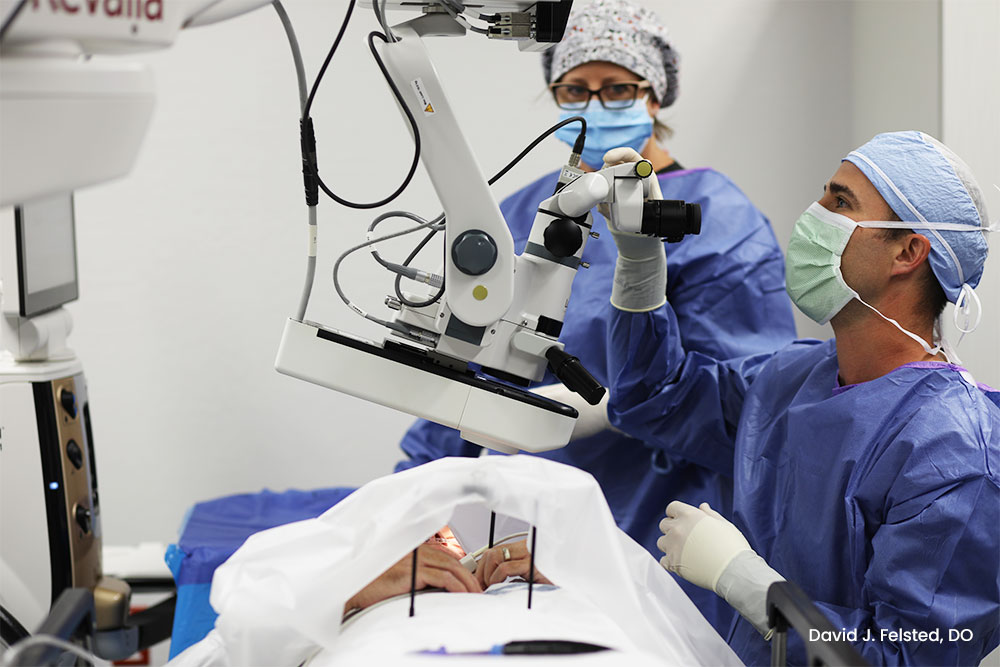
At M&M Eye Institute, we’re here to guide you through the entire process—from evaluation to surgery and recovery—so you can move forward confidently and clearly.
Understanding Cataract Surgery
Cataracts cannot be treated with medication or lifestyle changes—they must be removed surgically. Fortunately, modern cataract surgery is a quick, safe, and highly effective procedure. Using phacoemulsification, your surgeon will create a small, self-healing incision, remove the clouded natural lens, and replace it with a clear artificial lens, known as an intraocular lens (IOL).
This advanced approach results in minimal discomfort, a short recovery time, and excellent visual outcomes.
Choosing the Right Lens for Your Lifestyle
Thanks to recent advancements in lens technology, you now have options beyond standard monofocal lenses:
-
Monofocal lenses correct vision at one distance (usually far), often requiring reading glasses after surgery.
-
Advanced technology lenses (such as multifocal or extended depth-of-focus lenses) may reduce or eliminate your need for glasses at all distances.
Not everyone is a candidate for premium lenses; additional testing may be required. Your doctor will help you select the lens that best fits your visual needs, lifestyle, and goals.
Note: While basic mono-focal lenses are typically covered by insurance, advanced lenses and some premium services may involve additional costs. During your consultation, we’ll review all your options and answer your questions.
What Happens During a Cataract Evaluation?
Your cataract evaluation begins with a comprehensive eye exam to assess your overall eye health and determine if cataracts are present. If you are a candidate for surgery, you’ll also meet with a patient care counselor to discuss:
-
Surgical expectations
-
Lens options
-
Pre and post-operative instructions
-
Insurance coverage and potential out-of-pocket costs
Pre-Surgery: How to Prepare
One Week Before Surgery:
-
You’ll return to your eye doctor for pre-operative testing to determine the correct IOL for your eye.
-
Make plans for transportation on the day of surgery—you won’t be able to drive yourself home.
-
If you live alone, consider arranging help for the first day or two after surgery.
The Night Before Surgery:
-
Follow any instructions your doctor gives, including using prescribed eye drops.
-
Do not eat or drink after midnight (unless otherwise instructed).
-
Avoid alcohol and get a good night’s sleep.
-
Let your provider know if you take any daily medications.
The Day of Surgery:
-
Do not eat or drink anything in the morning of your procedure.
-
Dress comfortably and avoid wearing makeup, lotions, perfumes, or colognes.
-
Arrive early for check-in and bring any paperwork or questions.
The procedure is quick—often taking less than 30 minutes—and most patients return home within two hours.
What About Insurance?
Most insurance plans and Medicare cover cataract surgery with a standard monofocal lens. This includes:
-
Surgeon fees
-
Anesthesia
-
Surgery center charges
Those costs may not be covered if you choose an advanced lens or other premium services. We’ll help you navigate your benefits and clearly break down any costs involved.
Final Steps: Medical Clearance
Before your surgery, your primary care physician may conduct a brief evaluation to ensure you’re medically fit for the procedure. This might include checking for conditions such as high blood pressure or diabetes that could affect your recovery.
Your Vision, Our Priority
At M&M Eye Institute, we understand how important your vision is. Our experienced team is here to ensure every step of your cataract journey is smooth, safe, and personalized to your needs.
If you’re noticing changes in your vision or have been diagnosed with cataracts, contact us today to schedule your consultation. We’re proud to serve communities across Arizona with expert care and advanced technology.
